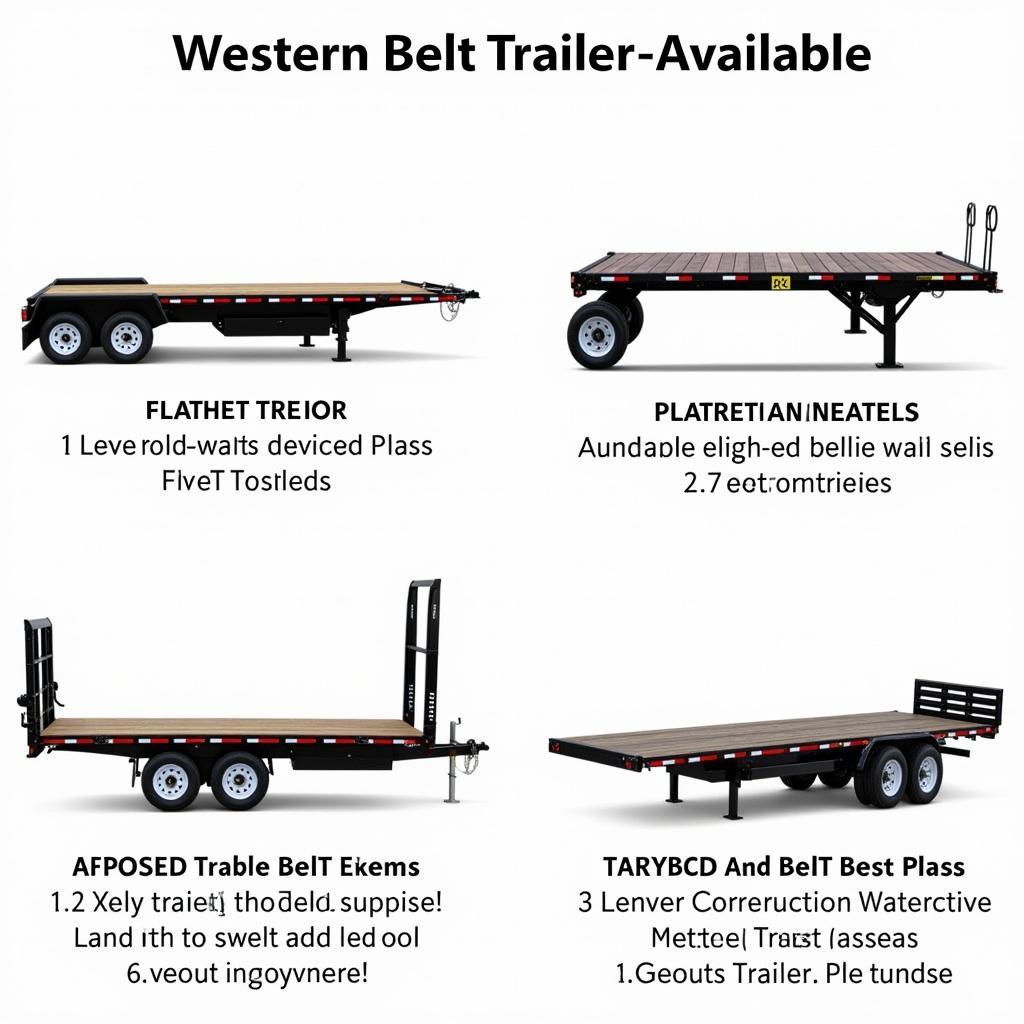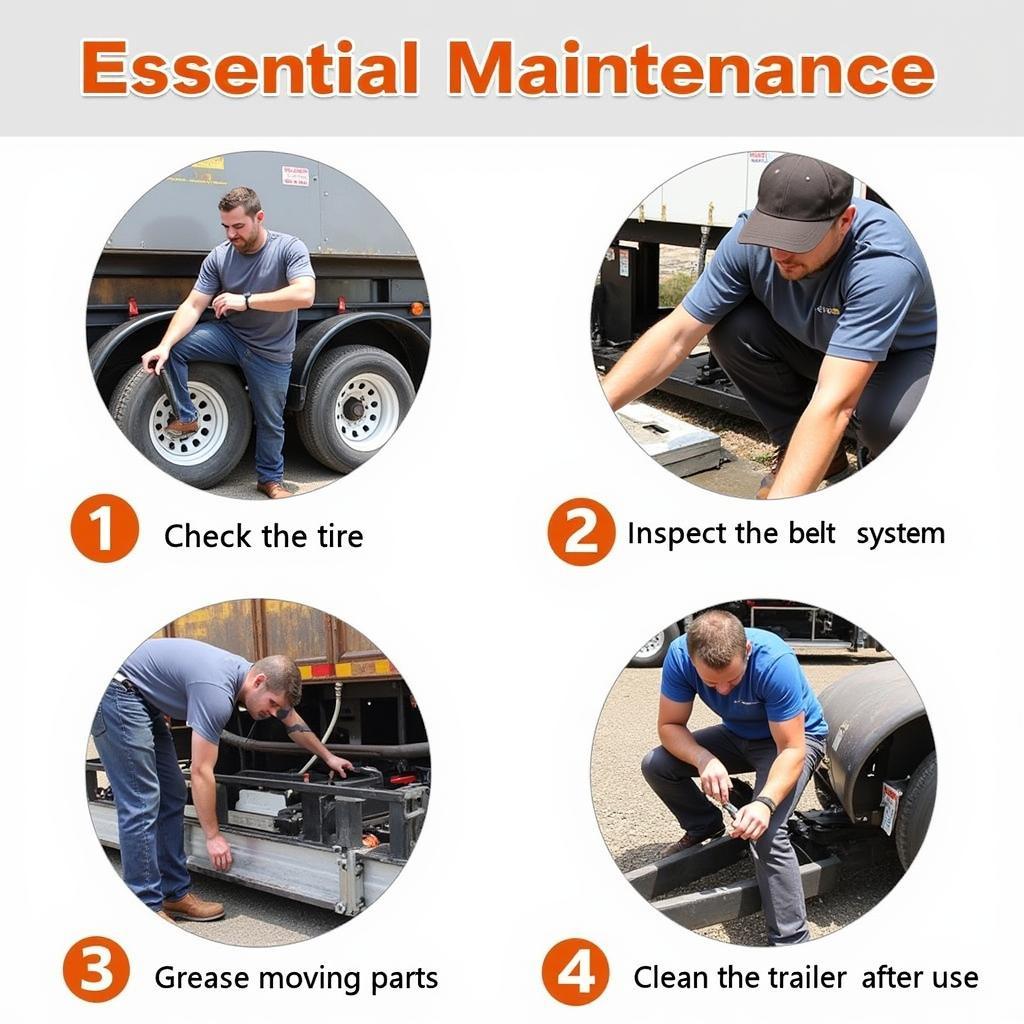Western Belt Trailers: The Ultimate Guide to Choosing Your Perfect Ride
October 28, 2024Western Belt Trailers are a staple for anyone needing to transport heavy loads with a touch of rugged style. These trailers, named for their unique belt-driven conveyor system, offer unparalleled durability and versatility for various hauling needs. Whether you’re a rancher moving cattle, a construction crew transporting materials, or an equestrian enthusiast heading to a show, understanding the nuances of western belt trailers can help you find the perfect match for your needs.
 Different Types of Western Belt Trailers
Different Types of Western Belt Trailers
What Sets Western Belt Trailers Apart?
Unlike traditional trailers that rely on ramps, western belt trailers utilize a powered conveyor belt system. This system offers several advantages, making them a popular choice for various tasks:
- Ease of Loading and Unloading: The belt system allows for smooth and controlled loading and unloading, reducing the risk of injury to both handler and cargo. This is especially beneficial for livestock, as it minimizes stress and promotes safer handling.
- Versatility in Cargo: From hay bales and equipment to livestock and palletized goods, western belt trailers can handle diverse cargo types.
- Durability and Longevity: Built to withstand demanding conditions, these trailers are crafted from high-quality materials, ensuring long-term performance and reliability.
Exploring the Different Types of Western Belt Trailers
Understanding the different types of western belt trailers is crucial to making an informed decision:
1. Livestock Trailers:
Designed specifically for transporting livestock, these trailers prioritize animal safety and comfort. Key features often include:
- Ventilation and Temperature Control: Proper airflow and temperature regulation are crucial for animal well-being, especially during long hauls.
- Dividers and Partitions: Adjustable dividers allow for separating animals by size or temperament, ensuring a less stressful journey.
- Durable Flooring: Non-slip, easy-to-clean flooring promotes hygiene and prevents injuries during transport.
2. Flatbed Belt Trailers:
This versatile option offers a flat platform with a conveyor belt system, making it ideal for hauling large or awkwardly shaped items. They are commonly used for:
- Construction Materials: Transporting lumber, pipes, roofing materials, and other building supplies.
- Agricultural Products: Moving hay bales, equipment, and harvested crops with ease.
3. Dump Belt Trailers:
Combining the convenience of a belt system with a dumping mechanism, these trailers are highly efficient for unloading bulk materials like:
- Gravel and Sand: The belt system allows for controlled and even distribution of materials.
- Grain and Feed: Quickly unloading large quantities of grain or feed at storage facilities.
Factors to Consider When Choosing a Western Belt Trailer
Selecting the right western belt trailer depends on your specific needs and intended use. Here are key factors to consider:
1. Trailer Size and Weight Capacity:
- Cargo Volume: Accurately estimate the volume of cargo you’ll be transporting to determine the required trailer size.
- Weight Limits: Ensure the trailer’s Gross Vehicle Weight Rating (GVWR) aligns with both your cargo weight and your towing vehicle’s capacity.
2. Belt System Specifications:
- Belt Material: Different belt materials offer varying levels of durability and slip resistance. Consider the type of cargo you’ll be hauling.
- Belt Speed and Power: Adjustable belt speed allows for customized loading and unloading, while sufficient power is crucial for moving heavy loads.
3. Additional Features:
- Braking System: Electric or hydraulic brakes provide enhanced stopping power, especially for heavier loads.
- Suspension Type: Leaf spring or torsion axles each have their advantages depending on the terrain and load requirements.
- Tire Size and Type: Selecting the appropriate tire size and tread pattern ensures optimal traction and load-carrying capacity.
 Essential Maintenance for Your Western Belt Trailer
Essential Maintenance for Your Western Belt Trailer
Western Belt Trailer Maintenance: Ensuring Optimal Performance
Proper maintenance is essential for extending the lifespan of your western belt trailer and preventing costly repairs. Key maintenance tasks include:
- Regular Cleaning: Removing dirt, debris, and manure prevents corrosion and keeps the trailer looking its best.
- Belt Inspection and Adjustment: Check the belt for signs of wear and tear, ensuring proper tension and alignment.
- Lubrication: Regularly grease all moving parts, including the belt rollers, bearings, and hitch components, to reduce friction and wear.
Conclusion: Invest in Efficiency and Durability
Western belt trailers offer a unique blend of efficiency, durability, and versatility, making them an invaluable asset for various industries. By understanding the different types, features, and maintenance requirements, you can confidently choose the perfect trailer to streamline your hauling operations and tackle any job with ease.
FAQs
- What is the average lifespan of a western belt trailer?
With proper maintenance, a well-built western belt trailer can last for 10-15 years or even longer.
- Can I use a western belt trailer for hauling equipment and livestock?
While some trailers are designed for specific purposes, many flatbed belt trailers can accommodate both equipment and livestock with proper precautions and adjustments.
- What are the essential safety features to look for in a livestock western belt trailer?
Key safety features include adequate ventilation, secure latches, non-slip flooring, and emergency escape hatches.
- How often should I inspect and lubricate the belt system on my trailer?
It’s recommended to inspect the belt system before and after each use, while lubrication should be performed every 3-6 months or more frequently depending on usage.
- Where can I find reputable dealers or manufacturers of western belt trailers?
Start your search online for reputable trailer dealers or manufacturers in your area, checking for customer reviews and certifications.
Need help finding the perfect Western belt trailer? Contact us at Phone Number: 0915117113, Email: [email protected] Or visit our address: To 3 Kp Binh An, Phu Thuong, Vietnam, Binh Phuoc 830000, Vietnam. Our customer support team is available 24/7. We also offer a wide selection of horse trailers and utility trailers.